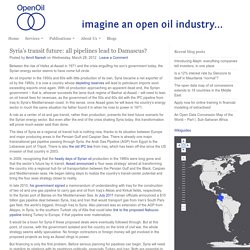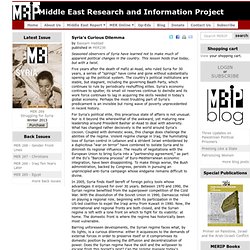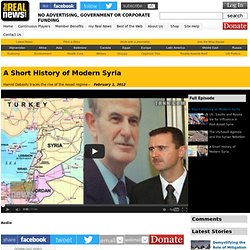

Heydemann-24-4.
Syria - blogs / resrouces. Syria - curators... The Syrian Military. The Syrian civil war. Syria's Worst Nightmare: Iraq Post-1991 and We're Heading There. Syria in world politics. The international dimensions of the Syrian uprising... Syria’s transit future: all pipelines lead to Damascus? Posted by Amrit Naresh on Wednesday, March 28, 2012 · Leave a Comment Between the rise of Hafez al-Assad in 1971 and the crisis engulfing his son’s government today, the Syrian energy sector seems to have come full circle.

An oil importer in the 1950s and 60s with little production of its own, Syria became a net exporter of oil by the 1980s; it is now a country whose depleting reserves will lead to petroleum imports soon exceeding exports once again. With oil production approaching an apparent dead end, the Syrian government – that is, whoever succeeds the lame duck regime of Bashar al-Assad – will need to lean on oil transit fees for revenues, as the government of the 50s and 60s did with the IPC pipeline from Iraq to Syria’s Mediterranean coast. In this sense, once Assad goes he will leave his country’s energy sector in much the same situation his father found it in when he rose to power in 1971. It would be a boon for Syria if these proposed deals were eventually followed through.
The Syria Report - Economy, Business and Finance - Syria and the Middle East. Syria's Curious Dilemma. Seasoned observers of Syria have learned not to make much of apparent political changes in the country.

This lesson holds true today, but with a twist. Five years after the death of Hafiz al-Asad, who ruled Syria for 30 years, a series of "springs" have come and gone without substantially opening up the political system. The country's political institutions are stable, but stagnant, including the governing Baath Party, which continues to rule by periodically reshuffling elites. Syria's economy continues to sputter, its small oil reserves continue to dwindle and its work force continues to lag in acquiring the skills needed in today's global economy.
Perhaps the most troubling part of Syria's predicament is an invisible but rising wave of poverty unprecedented in recent history. For Syria's political elite, this precarious state of affairs is not unusual. In 2005, Syria finds itself bereft of foreign policy tools whose advantages it enjoyed for over 30 years. Back to Basics.
A Short History of Modern Syria. Hamid Dabashi traces the rise of the Assad regime - Bio Hamid Dabashi is the Hagop Kevorkian Professor of Iranian Studies and Comparative Literature at Columbia University.

He received a dual Ph.D. in Sociology of Culture and Islamic Studies from the University of Pennsylvania in 1984, followed by a postdoctoral fellowship at Harvard University. He wrote his dissertation on Max Weber's theory of charismatic authority with Philip Rieff (1922-2006), the most distinguished Freudian cultural critic of his time. Professor Dabashi has taught and delivered lectures in many North American, European, Arab, and Iranian universities.
Professor Dabashi has written twenty-five books, edited four, and contributed chapters to many more. Transcript PAUL JAY, SENIOR EDITOR, TRNN: Welcome to The Real News Network. End DISCLAIMER: Please note that transcripts for The Real News Network are typed from a recording of the program. Comments. History has not been kind to Syria's desire for change. A dog in Lebanon, an old joke goes, was so hungry, mangy and tired of civil war that he escaped to Syria.

To the surprise of the other dogs, he returned a few months later. Seeing him better groomed and fatter than before, they asked whether the Syrians had been good to him. "Very good. " "Did they feed and wash you? " "Yes. " It is impossible not to sympathise with Syrians' desire to be treated like adults. But all dictators are at risk from changed international circumstances, a spark (like a self-immolation in Tunisia) or the sudden realisation that the regime is vulnerable.